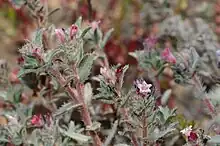| Moltkiopsis | |
|---|---|
 | |
| Moltkiopsis ciliata | |
| Scientific classification | |
| Kingdom: | Plantae |
| Clade: | Tracheophytes |
| Clade: | Angiosperms |
| Clade: | Eudicots |
| Clade: | Asterids |
| Order: | Boraginales |
| Family: | Boraginaceae |
| Genus: | Moltkiopsis I.M.Johnst. |
| Species: | M. ciliata |
| Binomial name | |
| Moltkiopsis ciliata (Forssk.) I.M.Johnst. | |
| Synonyms | |
| |
Moltkiopsis is a monotypic genus of flowering plants belonging to the family Boraginaceae. The only species is Moltkiopsis ciliata.[1]
Its native range is northern Africa to Sahel and the Arabian Peninsula. It is found in the regions of Algeria, Chad, Egypt, the Gulf States, Iran, Iraq, Kuwait, Libya, Mali, Mauritania, Morocco, Niger, Oman, Palestine, Saudi Arabia, Sinai, Sudan, Tunisia and the western Sahara.[1]
The genus name of Moltkiopsis is in honour of Joachim Godske Moltke (1746–1818), the Prime Minister of Denmark from 1814 to 1818. He was also father of Prime Minister Adam Wilhelm Moltke and the son of Danish diplomat Adam Gottlob Moltke.[2] The Latin specific epithet of ciliata is derived from ciliatus meaning fringed.[3] Both genus and species were first described and published in J. Arnold Arbor. Vol.34 on pages 2-3 in 1953.[4]
References
- 1 2 "Moltkiopsis I.M.Johnst. | Plants of the World Online | Kew Science". Plants of the World Online. Retrieved 27 May 2021.
- ↑ Burkhardt, Lotte (2018). Verzeichnis eponymischer Pflanzennamen – Erweiterte Edition [Index of Eponymic Plant Names – Extended Edition] (pdf) (in German). Berlin: Botanic Garden and Botanical Museum, Freie Universität Berlin. doi:10.3372/epolist2018. ISBN 978-3-946292-26-5. Retrieved 1 January 2021.
- ↑ Harrison, Lorraine (2012). RHS Latin for Gardeners. United Kingdom: Mitchell Beazley. ISBN 184533731X.
- ↑ "Moltkiopsis ciliata (Forssk.) I.M.Johnst. | Plants of the World Online | Kew Science". Plants of the World Online. Retrieved 27 October 2021.